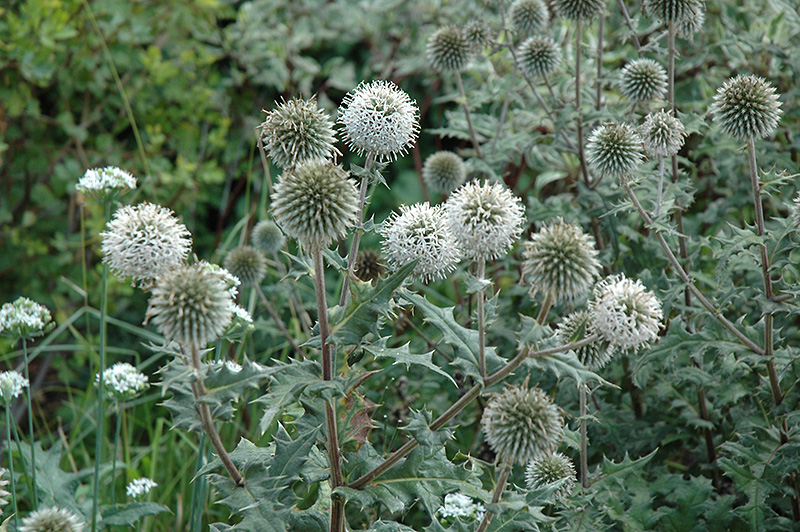Arctic Glow Globe Thistle Echinops sphaerocephalus 'Arctic Glow' Height: 3 feet Spread: 18 inches
Sunlight:
Hardiness Zone: 3 Other Names: Great Globe Thistle Description: Daring globe-shaped white flowers steal the show when in bloom on a plant that's more compact than the species, not an invasive type of thistle; good for attracting pollinators; plant in poor soils and do not over-fertilize Ornamental Features Arctic Glow Globe Thistle features bold white pincushion flowers at the ends of the stems from mid summer to early fall. The flowers are excellent for cutting. Its attractive spiny lobed leaves remain grayish green in color with curious silver undersides throughout the season. Landscape Attributes Arctic Glow Globe Thistle is an herbaceous perennial with an upright spreading habit of growth. Its relatively coarse texture can be used to stand it apart from other garden plants with finer foliage. This is a relatively low maintenance plant, and is best cleaned up in early spring before it resumes active growth for the season. It is a good choice for attracting bees and butterflies to your yard, but is not particularly attractive to deer who tend to leave it alone in favor of tastier treats. It has no significant negative characteristics. Arctic Glow Globe Thistle is recommended for the following landscape applications; Planting & Growing Arctic Glow Globe Thistle will grow to be about 28 inches tall at maturity, with a spread of 18 inches. It grows at a fast rate, and under ideal conditions can be expected to live for approximately 10 years. As an herbaceous perennial, this plant will usually die back to the crown each winter, and will regrow from the base each spring. Be careful not to disturb the crown in late winter when it may not be readily seen! This plant should only be grown in full sunlight. It prefers dry to average moisture levels with very well-drained soil, and will often die in standing water. It is considered to be drought-tolerant, and thus makes an ideal choice for a low-water garden or xeriscape application. It is particular about its soil conditions, with a strong preference for poor, alkaline soils. It is somewhat tolerant of urban pollution. This is a selection of a native North American species. It can be propagated by division; however, as a cultivated variety, be aware that it may be subject to certain restrictions or prohibitions on propagation.
![]()
![]()
![]()
![]()
![]()
![]()
![]()
![]()
![]()
![]()
![]()
![]()
![]()
Characteristics
Applications
Features & Attributes

